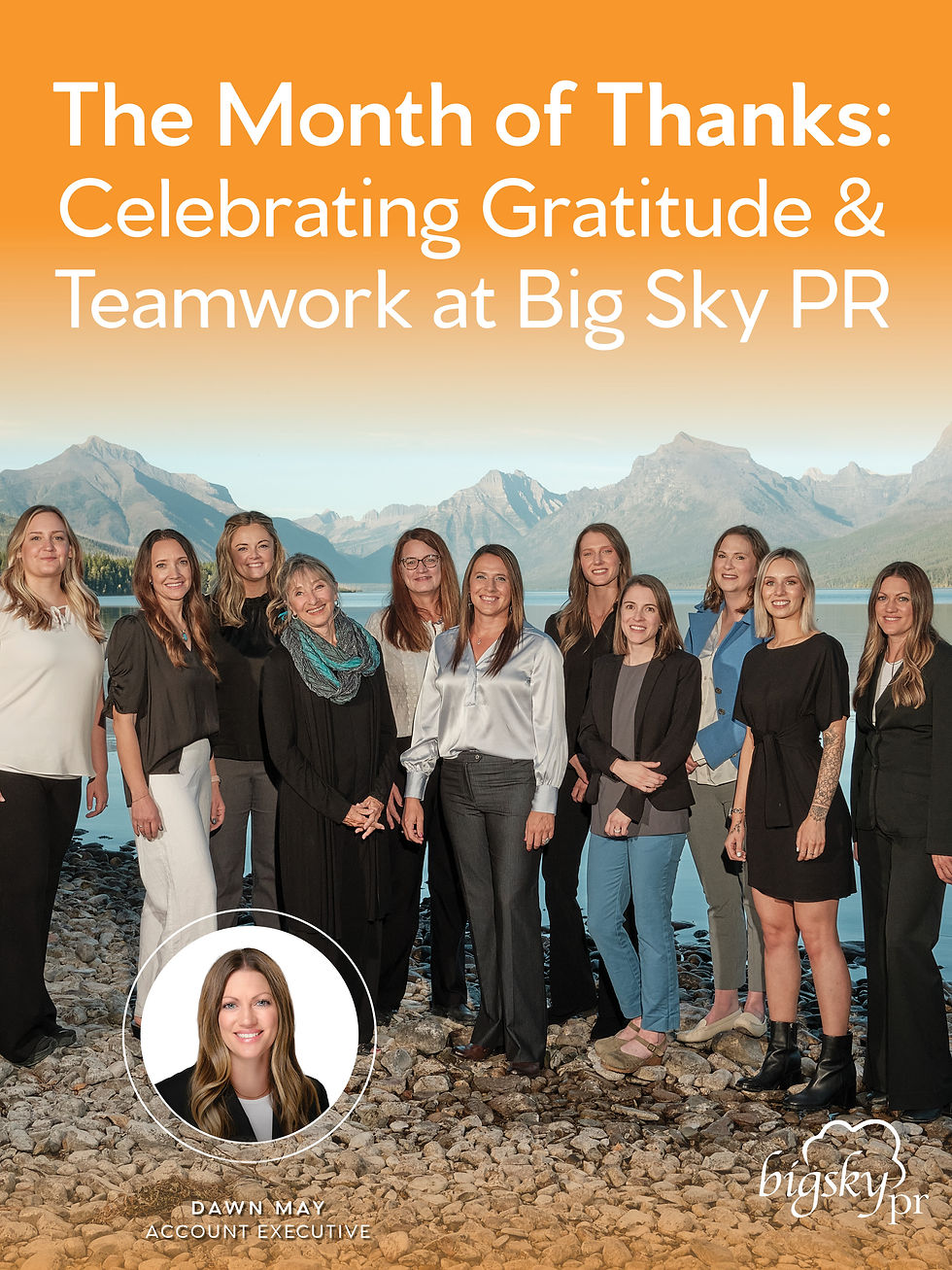Lessons from the Saddle: PR Edition
- Paulina Crum

- Apr 7, 2022
- 4 min read

At Big Sky Public Relations, our team takes pride in our hobbies and interests, which carry transferable lessons. The Big Sky PR team has multiple horse-lovers and horseback riders, so we naturally see connections between what we have learned in the saddle and in the office. Whether you consider yourself a horseback rider or not, let us take you out on the proverbial trail to learn all the horsey wisdom we possess.
“Getting back on”
As a rider, the most paramount lesson I have learned comes from falling off my horse. Or, really what I do after I fall off and hit the dusty ground. I get back on and ride again. Of course, this is a vivid cliche that we are all familiar with, but I wish to break down the meaning of “getting back on” further than when it is heard in passing.
This is one of the first lessons you learn horseback riding and that you will continue to encounter no matter how advanced you become. There is nothing fun about falling off, but it is humbling to know that everyone falls and how you handle that moment of failure is within your control. No matter your stage in your public relations career, we all get thrown out of the saddle by unexpected challenges.
Admittedly, it is occasionally tempting to want to stay motionless on the ground after shockingly being ‘bucked’ off, in the arena of riding or public relations. A ‘buck’ in public relations could be an unexpected crisis. In stressful crisis situations, it may be tempting to go dark and avoid any communication. But in horseback riding, it is treated as routine or second nature to get back on no matter the circumstances. A similar commitment to approaching a problem is valuable for public relations professionals. The best communications professionals know that crises will happen, and they have a routine for how to get back on, shift perspective and create a solution to navigate that tough time. Many times, you will not have the exact answer for how to solve the problem, but developing a routine of showing up to the most daunting challenges is the best first step.
Speaking for myself, I hold no resentment when I get back on to face the same challenge with my horse. Instead, getting back on feels like a clean slate and an opportunity to continue again with more strength than you had before. It may be difficult to approach all real-world problems at work with this same calmness but shifting perspective to view a hiccup or failure as a fresh start will undoubtedly provide you more hope than when you felt yourself hit the ground after a shocking ‘buck.’
Partnership
There is an immense amount of trust and constant communication that upholds a strong partnership between a horse and rider. Overall, the horse and rider relationship is the ideal example of a successful partnership. As a rider, you are trusting an animal that is approximately 1,200 pounds to not harm you intentionally or unintentionally, and are borrowing its strength and ability to jump over large obstacles or climb a high mountain trail. On the flip side, the horse is releasing to the rider a portion of its autonomy and original purpose of wildly wandering to be cared for in return and build skills that mentally stimulate the horse. Ultimately, there is a give and take that requires each to work in the best interest of the other to tackle shared challenges. In public relations we partner with clients, media, local businesses, and the greater community daily. In these partnerships, public relations professionals should seek to create value for the other individuals and work together to achieve mutual success.
Another element of horse and rider partnerships to draw public relations inspiration from is constant communication. If you have only watched horseback riding from afar and do not ride yourself, you may wonder, “Where is all this communication? Riding seems pretty silent to me.” On the contrary, the rider is always sending signals to the horse through brief verbal cues, leg cues, rein motions, and even in the way the rider shifts their weight in the saddle. The horse sends feedback to the rider through its own verbal cues (sighing, snorting, neighing), reactionary cues (bucking, rearing, side lunging), and the horse’s overall follow-through with your requests. When watching the most skilled horse and rider partnerships, this communication is effortless and invisible to the untrained eye. In the public relations field, we do not shy away from over-communicating. However, the customized communication the rider expresses to speak the horse’s language demonstrates the importance of transforming communication to resonate with different audiences. The way we normally communicate between our public relations team or with past clients may not be what is needed for a successful partnership with new teams or new clients. Adapting to create communication channels and practices that are designed specifically for the partnership, whatever it may be, is likely to provide a deeper level of understanding than a one-size-fits-all approach.
In Big Sky country, we love our horses, and at Big Sky PR, we love public relations! Hopefully you have walked away with a few more tools for tackling public relations challenges with a new perspective. Or, hopefully we have encouraged you to try out horseback riding. Either way, our team will call it a win. We welcome you to chat with any of us about our love of horses or our love of public relations anytime.
















Comments